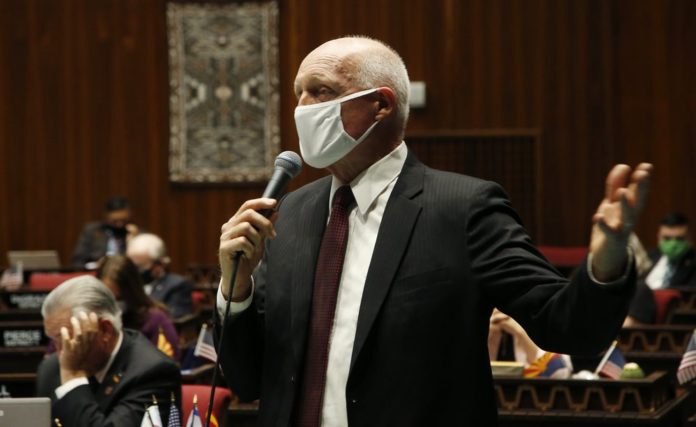
The Arizona Legislature begins its 2021 session on Monday in the midst of a pandemic that is once again enveloping the state and carries the potential to derail action for the second consecutive year.
But Republican and Democratic leaders of the House and Senate are already eyeing their top priorities for the session that includes rapidly pushing through legislation derailed when last year’s session was cut short, plus a raft of other issues that lawmakers consistently prioritize.
The most important fact is this: Republicans maintained control of both chambers in a year when Democrats were hopeful they would be in charge for the first time in decades. And moderate Republicans, like Sens. Kate Brophy McGee and Heather Carter, are out. Both chambers have more conservative GOP members than in years past.
That leaves Democrats aware that they hold little power, but hopeful they can at least steer some issues, most importantly relief for people and small businesses affected by the pandemic.
“COVID-19 response is extremely important for us,” House Minority Leader Reginald Bolding said.
The coronavirus will be the overarching presence at the Capitol. The public will be mainly kept out of the House and Senate buildings; senators and representatives will be able to vote and attend meetings remotely from their offices; most hearings will be held without live testimony and the media will have sharply limited access.
Masks will be mandatory in the Senate and House, although the House plans some leeway for members — if they are 6 feet from anyone else or sitting at their desks on the House floor.
Both Senate President Karen Fann and House Speaker Russell “Rusty” Bowers said they’re not afraid to shut down the session if an outbreak occurs. With Arizona the world’s virus hot spot, that is a big possibility.
The Legislature abruptly put its 2020 session on hold because of COVID-19 on March 23 after passing a basic budget, then briefly returned a month later and ended the session on May 26.
One of the Democrats’ top priorities will be boosting the state’s maximum $240 per week unemployment payments, but Fann said that’s a non-starter, at least for this year.
Another issue that is a top priority for many Republicans is reviewing the 2020 election that saw President-elect Joe Biden prevail in Arizona in a victory that President Donald Trump has said without evidence was fraudulent. There is no evidence that Arizona’s election was improperly run, but Fann has backed subpoenas seeking election records from Maricopa County and intends to continue that effort.
“If there were no irregularities, or fraud or anything else we can show the voters, say ‘look here you go, here’s the proof, it didn’t happen,’” Fann said. “If there are problems there we need to be aware of it and we need to fix it. But we won’t know until we do an audit.”
Democrats fear the end result will be voter suppression.
“Its frightening and it’s unfortunate,” Senate Minority Leader Rebecca Rios said. “Because again, they are so adamant in feeding into conspiracy theories and claiming an election was stolen that I think they’ll go to any means possible to pass legislation that further suppresses the vote in an effort to ensure they have a better chance of winning next time.”
The Legislature’s top task each year is passing a state budget. Many feared a huge budget deficit at the end of last year’s session but it did not materialize. That’s partly because Republican Gov. Doug Ducey used $400 million in federal coronavirus relief funds to boost state agency funding and partly because revenue has continued to grow despite mass layoffs and business closures caused by the pandemic.
The state has a $1 billion rainy day fund and may get close to a $500 million surplus for the budget year starting July 1.
And as usual, Republicans are likely to try to cut taxes, despite years of underfunded state agencies, low pay for public safety workers and a still-underfunded education system.
“I do know that there are some conversations going on about the possibility of tax reform,” Fann said. “We know that there’s always some strong conversations about tax reforms or tax reductions.”
Republicans are angry that voters in November approved a new tax on high-earning Arizonans to boost school funding that is expected to bring in about $900 million a year starting in 2022. They’re fighting Proposition 208 in court, while vowing to cut taxes again this year.
“Public education in Arizona continues to be at the bottom of the priority list,” Rios said. “And my fear is they’re going to continue to do that under the guise of ‘well Prop 208 has passed,’ while at the same time trying to dismantle Prop 208.”
Top on Bolding’s priority list are reforming an unemployment system that was overwhelmed by hundreds of thousands of claims, beefing up the depleted unemployment compensation fund, pushing cash into the state housing trust fund, boosting broadband funding so that low-income Arizonans can access schools and helping small businesses.
And both parties are eying criminal justice reform, although it’s unlikely that Arizona’s stiff sentencing laws will be revised.
Other issues expected to get big attention include trying to increase the state’s water supply, a GOP proposal to shield businesses, schools and other institutions from liability for COVID-19 cases, and Republican concerns that schools are not providing in-person instruction to students and efforts to limit ballot initiatives.
Republished with the permission of the Associated Press.














